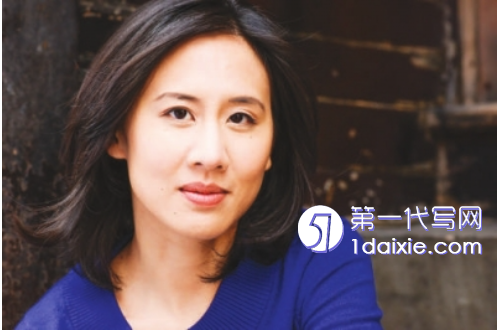本文是一篇英语毕业论文,本文以文学伦理学批评理论为理论指导,通过探讨小说《小小小小的火》中特定时代背景下的伦理环境,在文本细读的基础上分析主人公面临的伦理冲突、做出的伦理选择及启示意义。
Chapter One Introduction
1.1 The Focus of the Study

Celeste Ng is a writer who enjoys an admirable reputation in both American and European literarycircles.Ng’s personal experiences,like those of many other authors,have a deep influence on her andserve as the seedbed for book creation.Raised in Pennsylvania and Ohio,both parents are scientists.Ng’sfather Dr.Daniel L.Ng was a physicist,and her mother was a chemist.She is the second generation ofimmigrants from Hong Kong.In the late 1960s,she moved to Shaker Heights with her sister and parents.During the time at Shaker Heights High School,she was a member of a student club concerned withracial relations for three years and served as co-editor of Semanteme,the school’s literary journal,thenshe graduated in 1998.
After graduating from high school,Ng’s went to Boston,Massachusetts to continue studyingEnglish and graduated from the English Department of Harvard University.She went on to receive aMaster of Fine Arts in Creative Writing from the University of Michigan.While attending the Universityof Michigan,she was awarded the Hopwood Award for her short story What Passes Over.Soonafterwards,she taught writing at the University of Michigan and worked in Boston.She also performedthree years as an editor both at Fiction Writers Review.All of these daily and professional experienceseventually hone her great writing talents,and her experience as a Chinese American becomes one of herworks’topics.Ng currently lives with her family in Cambridge,Massachusetts,and keeps writing.
1.2 Literature Review
Celeste Ng’s debut novel,Everything I Never Told You,has received widespread acclaim in theUnited States and abroad.Her most recent work,Little Fires Everywhere,was quickly hailed as thegreatest novel of the year on Amazon and has received critical acclaim both at home and abroad.
1.2.1 Studies Abroad
Due to the fact that Little Fires Everywhere was published in 2017,there are even fewer research onthe novel,with the majority consisting of book reviews and comments on the television adaptation.
According to CNKI,from the Proceedings of the Third International Art Research Conference,athesis“Narrative Ethics in Celeste Ng’s Little Fires Everywhere”can be found,Shen Yuan and WangWenting(2019)analyze the narrative ethics of the novel from the story level,discourse level and reading level,and tend to further elaborate on the serious theme of tolerance and understanding between peoplesof different professions and colors.
According to ProQuest,there is only one academic paper:“Hulu Forges on Amidst Little FiresEverywhere”(2018)written by Michael Malone,it is a brief introduction to the plot and characters of thenovel.Since this book was adapted into a TV series by Hulu TV in 2020,many comments are based onTV shows,and mainly focus on the following themes:motherhood,race,consumerism,family dynamics,relationships and domesticity,suburbia,creativity,American value,etc.For instance:Jodi Picoult(2018),a New York Times bestselling novelist,remarks on the central themes of Little Fires Everywhere.Sheholds that Celeste Ng dissects a microcosm of American culture with brilliance and elegance,exactlywhen we need to examine it under the microscope.In“All Ablaze:A tale of community mistrust in 90ssuburban America.”Henderson and Eleanor(2017)put forward that this novel is considerably moreambitious and brilliant than her first because of the wide and complicated network of moral links...it’s anexhilaratingly democratic use of omniscience they state.In“Secrets in suburbia”,Rachel Cooke(2020)views Elena as“Heart of glass”.
Chapter Two Ethical Environments
2.1 The Collision of Pragmatism and Neoliberalism
Literary works in a specific historical period show specific characteristics of the times.In LittleFires Everywhere,the ethical environment of the novel is first reflected in the collision of pragmatismand neoliberalism.The novel is set in the United States in 1998.The 20th century in the United Stateswas an era of ideological pluralism.
Starting from the effect and purpose,the pragmatism theory recognizes all the philosophical theoriesthat are conducive to achieving the goal and achieving results.Pragmatism does not attach importance toprocess and means.Pragmatists are concerned with the effect and the result of action.It is right to thinkthat what is useful is right(Zhang Huanhuan 9).From the progressive movement of political andeconomic reforms after the Civil War to the abolition of slavery and the enactment of laws grantingwomen and blacks the right to vote,the liberal reform kept advancing,and liberalization andanti-tradition gradually became the mainstream trend.Encouraged by neoliberalism,black civil rightsmovement,women’s liberation movement,hippie anti-establishment culture movement,new left radicalmovement,anti-Vietnam War movement emerged.At the same time,in the 1870s,pragmatism becamethe mainstream trend of thought in the United States,reflecting the American bourgeoisie’s eager way ofthinking and way of life,which exerted a great influence on law,politics,education,society,religion and art research.The new generation,represented by Mia and Elena,and the older generation,represented bytheir parents,show a deviation in values,that is a collision between liberal and conservative.
2.2 The Oppression of Women in Patriarchal Society
Most of the main characters in Little Fires Everywhere are female characters.Celeste Ng depicts thegroup of women with distinct personality from the feminist narrative standpoint.By describing thesurvival plight of these women with different identity,status and values,it reflects the process of thegradual awakening of American female consciousness under the promotion of the feminist movement inthe 20th century,and reveals the oppression of women under the ethical environment of patriarchy.
Since the women’s liberation movement in the late nineteenth-century,there have been three wavesin the feminist movement.The first one was around world War I and its main goal was to fight forwomen’s equal status in law and politics.From the 1960s to the 1980s,the second wave of feminismbegan to emphasize differences on the basis of the achievements made in the first stage,and tried torebuild the unique history and spiritual culture of women,with cultural demands as the main goal.Fromthe 1980s to the 1990s,with the western countries entering the post industrialized society,a theoreticalschool of postmodern feminism emerged.Some people call it the“third wave”of the feminist movement.This wave focuses on the universal investigation of women’s rights and women’s development as“human-being”,surpasses the gender differences between men and women,and rejects the binarydivision of Gender Opposition between men and women,The thesis holds that the gender differencebetween men and women should not be binary,and the people in the world are diverse.It makes acomprehensive investigation on various feminist theories(Duan Xiujuan 2).
Chapter Three Ethical Conflicts.................................25
3.1 The Conflicts Between Free Will and Rational Will...............................25
3.2 The Conflicts Between Mother and Daughter.................................26
3.3 The Conflicts Between Two Different Ethical Ideals of Whites and Non-whites.............29
Chapter Four Ethical Choices................................33
4.1 The Pursuit of Rational Choice...................................33
4.2 The Reconciliation of Mother-daughter Relationship..........................36
4.3 The Resistance and Escape of Marginalized People.......................................39
Chapter Five Conclusion.....................................42
Chapter Four Ethical Choices
4.1 The Pursuit of Rational Choice

Ethical Literary Criticism uses the Sphinx Factor to explain literary phenomena and analyze literaryworks.the Sphinx Factor comes from the Greek mythology about Sphinx,and is used to explain thecoexistence of good and evil in the process of ethical choice.In literature,since everyone is an organismof good and evil,it is actually a sphinx factor.The value of literary works lies in revealing the process ofpeople’s ethical choice through the different combination and change of human and animal factors.Theexpression form of human factor is rational will,the expression form of animal factor is natural will orfree will or non-rational will.When the characters in the novel are faced with ethical conflicts and turn toethical choices,their inner rational will and free will are constantly fighting.Ethical choices are often the result of multiple rounds of games between free will and rational will on moral subjects.The ethicalchoices of Mrs.Richardson and Mia are analyzed below.
The first part of the second chapter elaborates the ethical conflicts between free will and rational willand analyzes Elena’s inner contradictions and struggles.Before she met Mia,Mrs.Richardson wasconservative,but she made rational choices,such as donating to charitable foundations and taking care ofher family,so she gained a stable and prosperous life.However,after getting to know Mia,her innerdesires and impulses made her make irrational ethical choices,that is,to carry out illegal investigationson Mia’s life history and instigate Isabella to abuse her power,as well as to misunderstand her sonMoody and Pearl on the matter of abortion.Irrational choices get her into trouble,such as the houseburning down and her daughter Izzy fleeing.Finally,Elena realized the pain of losing her daughter.Under the guidance of rational will,Elena overcame her free will,put aside her resentment against Miaand anger against Izzy,and made up her mind to find and make up for her daughter with the rest of herlife.She also gathered the courage to find her true self and made a correct ethical choice.
Chapter Five Conclusion
In the 150-year history of Chinese-American literature,the territory of Chinese American literatureis expanding,and Chinese American writers emerge one after another.With her two best-selling novels,Celeste Ng has clearly become a rising star in the Chinese-American literary scene.Little FiresEverywhere was rated by AARP.org as better than Everything I Never Told You,which demonstratingCeleste Ng’s ethical appeal.By examining the ethical environments,ethical conflicts and ethical choicesof the characters in the novel,the thesis holds that there is a clear internal logic between the three ethicalfactors,which complement each other and cannot be separated.
Ethical environment is the premise of understanding literary works.By returning to the specifichistorical and ethical scene and understanding the social background of the characters,the causes ofethical conflicts can be explained.First of all,the collision of neoliberalism and conservatism providesthe necessary ideological conditions for the ethical conflict of the characters.The previous generationinfluenced by the spirit of pragmatism shaped the family ethical environment and social ethicalenvironment of pragmatism with their own experience.The pragmatism of the outside world conflictedwith their own spirit of neoliberalism,which limited the self-development of Mia and Elena,andtriggered the inner contradictions and struggles of the characters.Elena became an idealist under theinfluence of the values of Shaker Heights,but utilitarianism and egoism trapped her in an ethicaldilemma.Mia’s freedom and unruly was not understood by her original family,which made her graduallyembark on the road of vagrancy and become a marginalized person outside the mainstream society.Secondly,with the failure of the feminist movement,women unconsciously fall into the trap of patriarchyand become childbearing without female consciousness.The ubiquitous rules of Shaker Heights,women’s obedience to childbearing,and Mia’s surrogacy all reveal the oppression of women in thepatriarchal society.Finally,there exists the phenomenon of marginalization of The Other,advocatingwhite superiority and acquiescence in racial discrimination in Shaker Heights.The ethical environment ofwhite privilege results in aphasia and lack of living space of marginalized groups.
reference(omitted)
